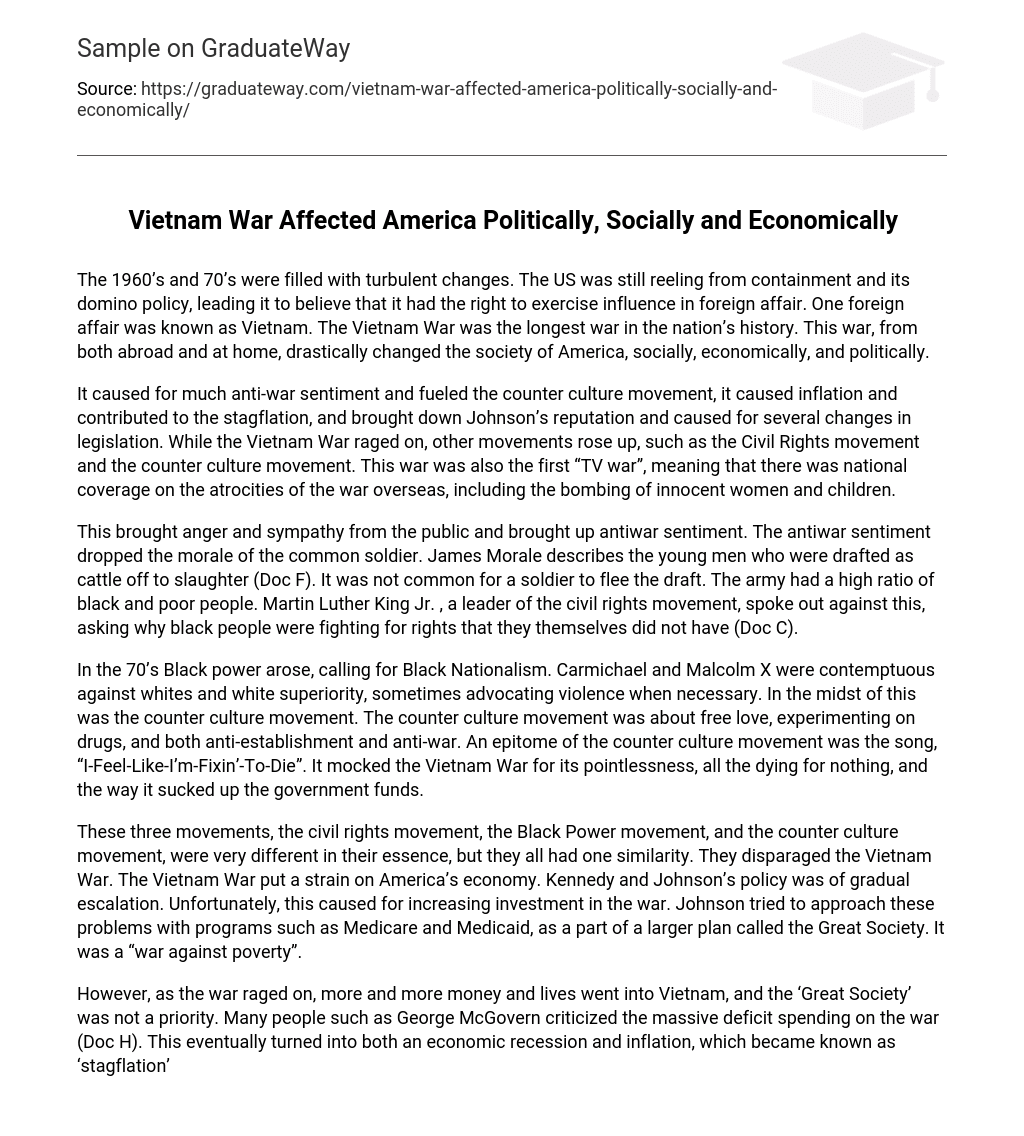In the 1960’s and 70’s, the United States underwent significant changes marked by turmoil. Despite recovering from containment and its domino policy, the US was self-assured in asserting its global influence. A pivotal event during this era was the Vietnam War, which emerged as the lengthiest war in American history. This conflict had a profound effect on society, triggering substantial social, economic, and political shifts both at home and abroad.
The Vietnam War led to a major anti-war sentiment and fueled the counter culture movement. It also caused inflation and contributed to stagflation, while tarnishing Johnson’s reputation and leading to numerous legislative changes. Alongside the ongoing war, other movements emerged like the Civil Rights movement and the counter culture movement. Moreover, this war introduced televised warfare, with national coverage revealing overseas atrocities like the bombing of innocent women and children.
The public’s anger and sympathy were fueled by the rise in antiwar sentiment resulting from this situation. The morale of the average soldier was significantly impacted by this antiwar sentiment, according to James Morale, who viewed young men who were drafted as being sent off to be slaughtered like cattle (Doc F). Deserter rates among soldiers were low, and there was a significant representation of black and economically disadvantaged individuals serving in the army. Martin Luther King Jr., a prominent leader in the civil rights movement, criticized this and raised questions about why black people were fighting for rights they did not have themselves (Doc C).
In the 1970s, two significant movements emerged: Black power and the counter culture movement. The Black power movement, led by figures such as Carmichael and Malcolm X, advocated for Black Nationalism and expressed contempt towards whites and their belief in superiority. Some even endorsed violence. Concurrently, the counter culture movement arose, promoting free love, drug experimentation, opposition to established norms, and opposing the Vietnam War. A notable representation of this movement was the song “I-Feel-Like-I’m-Fixin’-To-Die,” which cleverly satirized the war’s pointless nature, unnecessary loss of life, and its impact on government resources.
The civil rights movement, the Black Power movement, and the counter culture movement all shared a common opposition to the Vietnam War. Despite their different characteristics, they were united in their stance against it. Moreover, this war had detrimental impacts on America’s economy due to increased involvement by Kennedy and Johnson, resulting in greater financial obligations. In response to these challenges, Johnson introduced various measures under his comprehensive plan known as the Great Society including initiatives like Medicare and Medicaid with the goal of alleviating poverty.
Both money and lives were dedicated to the Vietnam War, causing neglect of social welfare programs like the ‘Great Society’. The excessive spending on the war was condemned by figures like George McGovern, leading to an economic downturn and inflation referred to as ‘stagflation’. Nixon, who succeeded Johnson as president, tried to address this problem through temporary freezes on prices and wages. Hence, it is evident that our handling of the Vietnam War was flawed.
According to Robert F. Kennedy, the absence of a resolution in Vietnam can be attributed not to a shortage of personnel, but rather to our reliance on manpower as a means of solving the issue (Doc E). Politically, the Vietnam War was intricate. It was triggered by multiple factors, including the political notion known as the Domino Effect. This concept posited that if one country fell under communism, nearby nations would also follow suit. It aligned with containment principles, which sought to restrict communism.
The Gulf of Tonkin Resolution was an unofficial declaration of war, giving the president the power to take any necessary action to defend the U.S. against aggression and armed attacks (Doc A). However, Congress later acknowledged their error and passed the War Powers Act in 1973. This act significantly restricted the Gulf of Tonkin Resolution by mandating that the president must inform Congress within 48 hours whenever he conducts a military operation (Doc I). The Tet Offensive marked a pivotal moment in the war.
Disillusionment with the war and anger drove many Americans to want to drop out without grace or honor, further increasing antiwar protests and diminishing Johnson’s popularity. Despite his desire to be remembered as the president who implemented various reforms, such as the passing of the Civil Rights Act and the Great Society, Johnson’s legacy is marred by the Vietnam War. This conflict becomes the defining factor for how he is remembered, portrayed metaphorically by the cartoon on Doc D.
In his address to the nation in Doc G, Nixon declares that the downfall of the Americans was not Vietnam, but rather the Americans themselves. The Vietnam War had a profound impact on the nation politically, socially, and economically. It was a tumultuous period characterized by numerous movements, reforms, and riots. The war disillusioned the people and led to the downfall of influential figures like Johnsons. While the lesson learned from Vietnam is not entirely clear, it is widely acknowledged that the effects of the war reverberated throughout the U.S.





